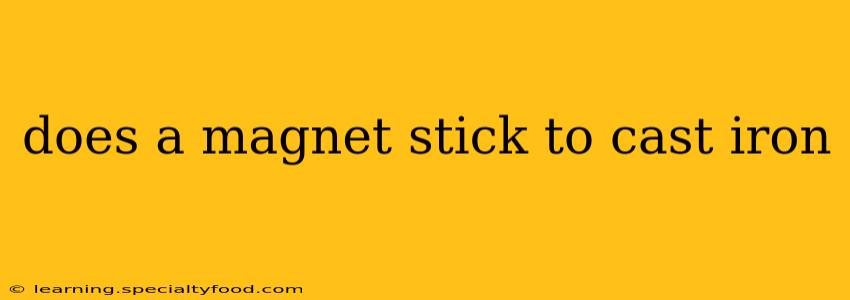Cast iron, a ubiquitous material in cookware, tools, and various other applications, often sparks the question: does a magnet stick to cast iron? The short answer is: yes, generally speaking, a magnet will stick to cast iron. However, the strength of the magnetic attraction can vary depending on several factors, which we'll explore in detail.
This guide delves into the reasons behind the magnetic properties of cast iron, explores exceptions to the rule, and addresses common questions surrounding this topic.
Why Does a Magnet Stick to Cast Iron?
Cast iron's magnetic properties stem from its composition. Cast iron is an alloy primarily consisting of iron, carbon, and silicon. The high iron content is the key. Iron is a ferromagnetic material, meaning it can be strongly magnetized. While the addition of carbon and silicon alters some properties, the iron's inherent magnetism remains dominant, resulting in the material being attracted to magnets.
What are the Exceptions?
While the majority of cast iron will be magnetic, there are some exceptions:
- Low-carbon cast iron: Cast iron with significantly lower carbon content might exhibit weaker magnetic attraction. The precise carbon level at which magnetism becomes significantly diminished is dependent on other alloying elements.
- Certain casting processes: The specific manufacturing process and cooling techniques can slightly influence the material's crystalline structure, potentially affecting its magnetic response. However, this effect is usually minimal.
- Presence of other metals: If the cast iron contains significant amounts of other non-magnetic metals, it may reduce the overall magnetic attraction.
How Strong is the Magnetic Attraction?
The strength of the magnetic attraction depends on several factors, including:
- The strength of the magnet: A stronger magnet will naturally exert a greater pull on the cast iron.
- The thickness of the cast iron: Thicker pieces of cast iron may show slightly stronger magnetic attraction due to the increased mass of iron.
- The type of cast iron: While most cast iron is magnetic, the type (e.g., grey cast iron, white cast iron, ductile iron) can subtly affect the magnetic response.
Does a magnet stick to all types of iron?
Not all types of iron are equally magnetic. While cast iron is usually strongly magnetic due to its high iron content, other forms of iron may exhibit weaker magnetism or none at all. For example, wrought iron, another type of iron, also has magnetic properties, though the strength might vary slightly compared to cast iron. The key difference is the presence of other alloying materials or differences in the crystalline structures of the iron that affect its magnetic properties.
Can I use a magnet to identify cast iron?
While a magnet is a helpful tool, it shouldn't be the sole method for identifying cast iron. A magnet adhering to a piece of metal suggests it likely contains iron, but it doesn't definitively confirm it's cast iron. Other ferrous metals like steel will also be magnetic. Physical inspection, density checks, or other material testing might be necessary for accurate identification.
What about stainless steel? Does a magnet stick to that?
This is a common point of confusion. Many stainless steels are not strongly magnetic, unlike cast iron. This is because the addition of elements like chromium and nickel in stainless steel changes its magnetic properties. While some types of stainless steel can exhibit weak magnetism, it's not a reliable indicator of the material being stainless steel, making the magnet test less helpful for stainless steel identification than it is for cast iron.
This information should help you understand the relationship between magnets and cast iron. Remember that while a magnet sticking to a piece of metal is a strong indication of the presence of iron, further tests might be necessary for definitive identification.
